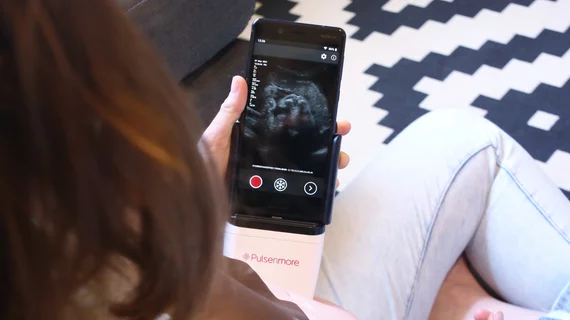GE Healthcare invests $50M in handheld tele-ultrasound device
GE Healthcare has agreed to invest up to $50 million in Pulsenmore, an Israeli startup that offers a home care ultrasound solution.
Pulsenmore created a handheld ultrasound device that docks with the user’s smartphone. The device is a novel self-operated prenatal home ultrasound solution that enables pregnant women to self-scan for remote clinical assessment by their healthcare provider when the device is combined with their smartphone.
The investment from GE Healthcare comes as telehealth has increased in demand and popularity since the onset of the COVID-19 pandemic. In an effort to reduce the spread of the COVID-19 virus, many patients put off routine care throughout the pandemic or turned to telehealth solutions. Healthcare providers also temporarily halted elective procedures and limited officer hours to retain resources for higher-acuity COVID-19 patients. As a result, telehealth has boomed and more solutions continue to come online.
“Healthcare providers are predicting a significant shift of care services from traditional facilities to the home, which will require an increase in the level of quality or access,” GE Healthcare Ultrasound President and CEO Roland Rott said in a statement. “Home care opens the door to tremendous value for payers, healthcare facilities, physician groups and care-at-home providers, with the opportunity to improve patients’ quality of care and experience. We also recognize the desire of patients—in this case, pregnant women—to be more empowered and involved in their healthcare.”
Pulsenmore, which launched in 2014, also has a mobile app for the patient to conduct offline and online consultations with a clinician, as well as a web application for clinician-side interaction with the platform and a software API enabling integration of Pulsenmore’s online services with organization health records.
The company plans to use the investment to accelerate global adoption of its device and pursue clearance from the Food and Drug Administration (FDA) and commercial expansion. Under the agreement, GE Healthcare will partner with Pulsenmore to distribute its products in Europe and other markets as the product becomes available for commercial distribution. GE Healthcare will also collaborate closely on developing ultrasound-based healthcare offerings for the home care market, which is expected to reach $662.67 billion by 2027––a compound annual growth rate of 14.2%, according to GE Healthcare.
GE Healthcare is GE's $17.7 billion healthcare business. The business has invested millions over the past several years in healthcare innovations.

